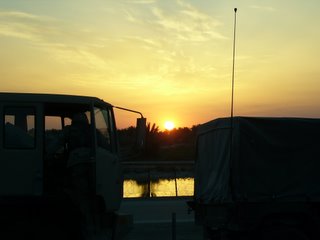
A lot has happened since my last post. The elections two weeks ago were a positive step forward. We'll have to see how the horse trading over the new parliament goes. As I've said before this is slow and messy work. The elections were not perfect, yet huge numbers showed up. Other problems with the Interior ministry prisons have cropped up. This is the danger of the militias. Many militia members were given jobs in the ministry and abused their position. The hope is that the next interior minister will be from a party with no militia ties.
I continue to be baffled by the media coverage of Iraq and the US government's inability to break through in getting the message out that the juggernaut of progress is moving in Iraq. The media is a strategic battleground and the target is primarily the American public. The insurgents still believe that they can snatch victory from the jaws of defeat with the right mix of made for TV bombings and killings. That is their strategic focus, not to hold any significant piece of territory or gain public support for their cause. They believe the fulcrum is American public opinion. If they can just keep up the metrics like number of attacks per day or number of "collaborators" killed, the Americans will pack up and go home. On a parallel track they seek to slow rebuilding and any deviation from their plan for Iraq. The average Iraqi may be unhappy with American soldiers on the street but they suffer as a direct result of insurgent violence and sabotage of the economy.
In the coming year more Iraqi security forces will come on line and take over more responsibility. The economy will continue to expand and the insurgency will become increasingly irrelevant and as a result weaker. We will have at least some troops in Iraq for many years to come.
My prayer for all Iraqis in the coming year is for peace, for prosperity and for God's blessing and mercy to be poured out on them. I think of my Iraqi friends, their children and families and pray that I might soon be able to return to them, sit in their houses and celebrate their new life, one build with their blood, their tears, herculean effort and faith in the future.
Happy New Year